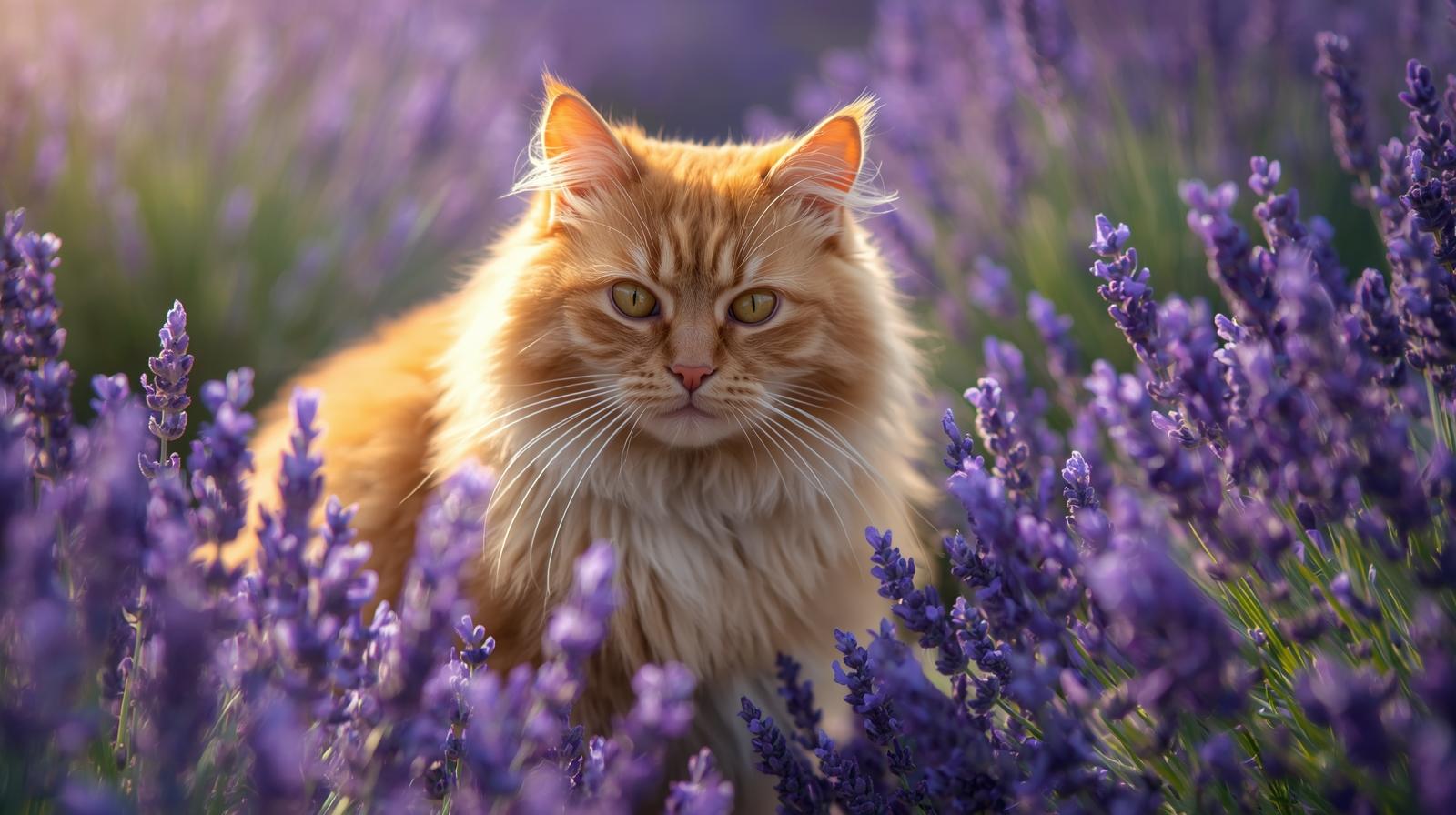Lavender is well known for its relaxing properties and pleasant scent, but what effect does lavender have on cats? Is it safe or toxic for them? In this article, we explore lavender’s effects on cats, the risks associated with its use, how to protect your feline, and which natural alternatives are safe for scenting your home. We will also introduce a lavender-based absorbent litter specifically formulated for cats as a safe option.
Lavender and cats: what you need to know
Lavender and cats is a topic that raises many questions among pet owners. While lavender is appreciated for its benefits in humans, its impact on felines is different. It is essential to understand whether lavender is toxic and how its use may affect cats’ health and wellbeing.
We will examine whether lavender is toxic for cats and how to minimise associated risks. It is important to know the components of lavender that may be harmful to cats. Lavender contains linalool and linalyl acetate, compounds that in large quantities can be toxic for felines. Although exposure to small amounts of lavender is usually not serious, precautions should always be taken to avoid bigger problems.
Is lavender toxic for cats? Myths and realities
There is a lot of confusion about whether lavender is safe for cats. The key lies in understanding the format. Toxicity is mainly linked to ingestion or exposure to large amounts of pure, highly concentrated lavender essential oil. This type of exposure should be avoided. However, it is important to recognise the difference between pure essential oils and commercial products.
Specialist brands that design products for pets use lavender fragrance in extremely low and safe concentrations. These formulas are designed to neutralise odours without exposing your cat to risk, allowing owners to enjoy a fresh and clean environment without compromising their pet’s health.
How to use lavender safely at home with cats
If you wish to use lavender in your home, it is crucial to do so safely to protect your cat. Here are some practical tips:
- Dilute essential oil: If you use lavender essential oil, make sure to dilute it in water and use it in diffusers designed for pets. Avoid applying it directly to your cat’s coat.
- Ventilate rooms: Ensure spaces are well ventilated to prevent a build-up of lavender vapours.
- Monitor your cat: Watch closely for any signs of discomfort or allergic reaction. If you notice symptoms, stop using lavender and consult your vet.
- Keep plants out of reach: If you have lavender plants at home, place them where your cat cannot reach them.
Also consider using cleaning products and air fresheners that are safe for pets. Look for natural options free of harsh chemicals that may irritate your cat.
For maintaining your cat’s hygiene, remember that choosing the right litter is key. Choose a dust-free litter to reduce particle inhalation and prevent respiratory issues. A good option is Sanicat litters, such as Sanicat classic litter with Lavanda fragrance, which offers odour control and is gentle on your cat’s paws.
Safe natural alternatives to scent your home with cats
If you prefer to avoid lavender as a precaution, there are many natural and safe alternatives to scent your home without putting your cat’s health at risk. Some options include:
- Chamomile: Has calming properties and is safe for cats. Can be used in mild infusions or diffusers.
- Catnip: While it does not scent the air, it is very attractive to cats and can help reduce stress and encourage play.
- Valerian: Provides relaxing effects similar to lavender but is safer for cats in small amounts.
- Bach flowers: Some Bach flowers can help reduce stress and anxiety in cats.
Consult a holistic vet to determine which are most suitable for your pet. Always introduce any new aroma or product gradually and observe your cat’s reaction. Every cat is unique and may respond differently to environmental stimuli.
Lavender and cat litter: keeping a dust-free, safe environment
Choosing the right cat litter is essential to keep the environment clean and safe. It is important to choose a litter that not only controls odours but is also dust-free. Brands such as Sanicat have developed advanced formulas that, in addition to being 99% dust-free, incorporate a delicate lavender scent that helps neutralise bad odours safely for your cat.
Sanicat Classic Lavender Litter, for example, uses a subtle, non-invasive fragrance that, unlike pure essential oils, does not pose a risk to your cat’s health, allowing you to enjoy a fresh, worry-free home.
Practical tips to protect your cat from toxic plants
There are many other plants that can be toxic to cats. To protect your feline, follow these practical tips:
- Research before buying: Before purchasing any plant, check if it is toxic to cats. Refer to safe and unsafe plant lists.
- Keep plants out of reach: Place plants on high shelves or hanging planters where your cat cannot reach.
- Train your cat: Teach your cat to stay away from plants using positive reinforcement.
- Offer safe alternatives: Provide safe plants for your cat to chew, such as cat grass or wheatgrass.
Consult your vet: If you suspect your cat has ingested a toxic plant, contact your vet immediately.

